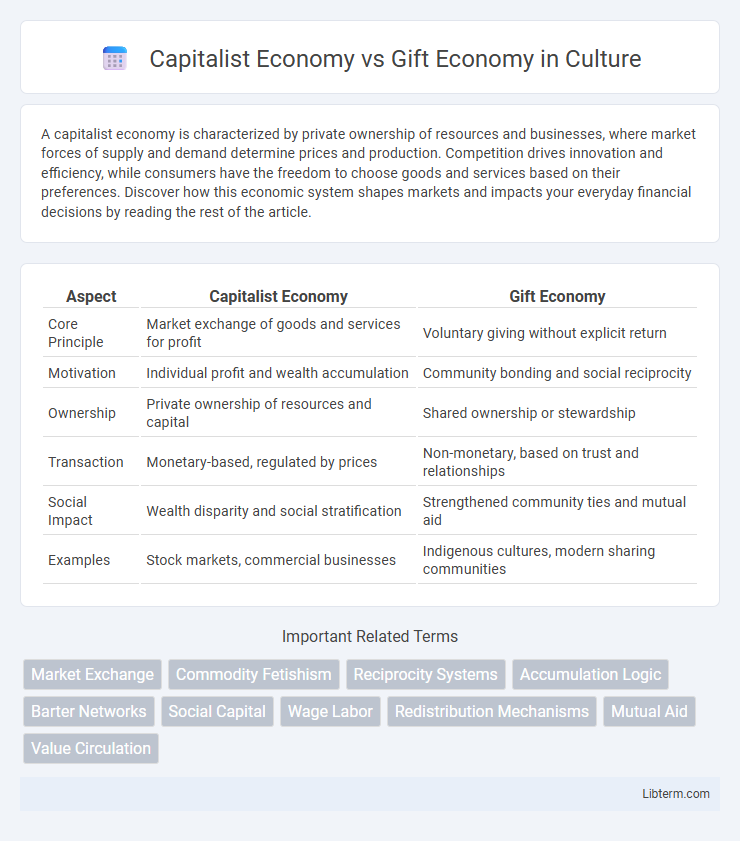A capitalist economy is characterized by private ownership of resources and businesses, where market forces of supply and demand determine prices and production. Competition drives innovation and efficiency, while consumers have the freedom to choose goods and services based on their preferences. Discover how this economic system shapes markets and impacts your everyday financial decisions by reading the rest of the article.
Table of Comparison
| Aspect | Capitalist Economy | Gift Economy |
|---|---|---|
| Core Principle | Market exchange of goods and services for profit | Voluntary giving without explicit return |
| Motivation | Individual profit and wealth accumulation | Community bonding and social reciprocity |
| Ownership | Private ownership of resources and capital | Shared ownership or stewardship |
| Transaction | Monetary-based, regulated by prices | Non-monetary, based on trust and relationships |
| Social Impact | Wealth disparity and social stratification | Strengthened community ties and mutual aid |
| Examples | Stock markets, commercial businesses | Indigenous cultures, modern sharing communities |
Introduction to Capitalist and Gift Economies
A capitalist economy operates on private ownership of resources and market-driven exchange, emphasizing profit maximization and competition. In contrast, a gift economy functions through voluntary giving without explicit agreements for immediate or future rewards, fostering social bonds and communal support. These two economic systems represent distinct approaches to resource distribution and value creation within societies.
Core Principles of Capitalist Economies
Capitalist economies prioritize private ownership, profit maximization, and market competition as core principles driving economic activity and resource allocation. Supply and demand dictate pricing mechanisms, encouraging innovation and efficiency to achieve economic growth. Individual incentives and capital accumulation underpin investment decisions and wealth distribution in these market-driven systems.
Fundamental Concepts of Gift Economies
Gift economies operate on the fundamental concepts of reciprocity, community bonding, and social cohesion, where goods and services are exchanged without explicit agreements or monetary transactions. Unlike capitalist economies driven by profit maximization and market competition, gift economies emphasize mutual aid and trust, fostering long-term relationships rather than individual accumulation. These economies rely on the cultural norms of generosity and gratitude, ensuring resource distribution through informal networks rather than formal contracts or pricing mechanisms.
Historical Development and Origins
The capitalist economy originated in the 16th century with the rise of mercantilism and was further propelled by the Industrial Revolution, marked by private ownership and profit-driven markets. In contrast, the gift economy traces back to prehistoric and tribal societies, operating on principles of reciprocity and social bonds without monetary exchange. While capitalism emphasizes individual wealth accumulation, gift economies focus on communal relationships and mutual aid as central to economic interactions.
Resource Distribution and Exchange Mechanisms
In a capitalist economy, resource distribution is driven by market forces where goods and services are exchanged based on supply, demand, and monetary value, promoting efficiency and profit maximization. Gift economies rely on reciprocal giving without explicit agreements or monetary exchange, fostering social bonds and community trust through voluntary resource sharing. The exchange mechanisms in capitalism emphasize transactional interactions, while gift economies prioritize relational networks and collective well-being.
Incentives and Motivations in Each System
In a capitalist economy, incentives are primarily driven by profit maximization and personal gain, motivating individuals and businesses to innovate, compete, and increase efficiency. Conversely, a gift economy fosters motivations rooted in social bonds, reciprocity, and community welfare, where exchange is based on generosity rather than monetary reward. These differing incentives shape economic behavior, with capitalism emphasizing individual accumulation and a gift economy prioritizing relational wealth and mutual support.
Social and Cultural Impacts
A capitalist economy fosters individualism and competition, often leading to social stratification and cultural emphasis on material wealth and consumerism. In contrast, a gift economy promotes community bonding, reciprocity, and trust, reinforcing social cohesion and cultural values centered on generosity and mutual support. The differing economic systems shape societal norms, influencing how communities prioritize relationships and social welfare.
Economic Efficiency and Sustainability
A capitalist economy drives economic efficiency through market competition, optimizing resource allocation and incentivizing innovation for profit maximization. In contrast, a gift economy promotes sustainability by emphasizing social relationships and reciprocal exchange, reducing waste and fostering communal resource management. While capitalism excels in scalability and productivity, gift economies prioritize long-term ecological balance and social cohesion.
Case Studies: Real-world Examples
The capitalist economy thrives on private ownership and profit motives, exemplified by the United States where corporate competition drives innovation and wealth creation, as seen in tech giants like Apple and Amazon. In contrast, gift economies emphasize reciprocity and community support, demonstrated in Indigenous societies such as the Kula ring in Papua New Guinea, where gift exchanges reinforce social bonds and political alliances. These case studies highlight the fundamental differences in resource distribution, social incentives, and economic sustainability between capitalist market-driven systems and community-oriented gift networks.
Future Prospects and Hybrid Models
Future prospects of capitalist economies emphasize innovation-driven growth and market efficiency, while gift economies prioritize communal well-being and reciprocal relationships. Emerging hybrid models integrate monetary incentives with social value systems, fostering cooperative consumption and decentralized resource sharing. These models leverage blockchain technology and social networks to create sustainable economic ecosystems balancing profit motives with altruistic principles.
Capitalist Economy Infographic

 libterm.com
libterm.com